Related Research Articles

Information Society is an American band from Minneapolis–St. Paul, Minnesota, initially active from 1982 to 1997, primarily consisting of Kurt Harland Larson, Paul Robb, and James Cassidy; the latter two reconvened the band in 2006, initially with Christopher Anton as lead vocalist, then with Harland rejoining them as lead vocalist by 2008.

Katrina and the Waves were a British rock band widely known for the 1985 hit "Walking on Sunshine". They also won the 1997 Eurovision Song Contest with the song "Love Shine a Light".

"Losing My Religion" is a song by American alternative rock band R.E.M., released in February 1991 as the first single from the group's seventh album, Out of Time (1991). Built on a mandolin riff, the song was an unlikely hit for the group, garnering extensive airplay on radio as well as on MTV and VH1 due to its critically acclaimed music video. The single became R.E.M.'s highest-charting hit in the United States, reaching No. 4 on the Billboard Hot 100 and expanding the group's popularity beyond its original fanbase. At the 1992 Grammy Awards, "Losing My Religion" won two awards: Best Short Form Music Video and Best Pop Performance by a Duo or Group with Vocal.
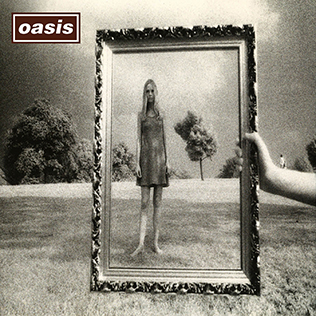
"Wonderwall" is a song by English rock band Oasis. It was written by Noel Gallagher. The song was produced by Gallagher and Owen Morris for the band's second studio album (What's the Story) Morning Glory?, released in 1995. According to Gallagher, "Wonderwall" describes "an imaginary friend who's gonna come and save you from yourself".
"Always on My Mind" is a ballad written by Wayne Carson, Johnny Christopher, and Mark James, first recorded by Brenda Lee, and first released by Gwen McCrae in March 1972. Lee's version was released three months later in June 1972. The song has been a crossover hit, charting in both the country and western and pop categories. Elvis Presley's recording was the first hit version of the song.
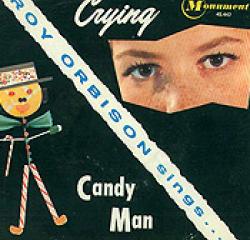
"Crying" is a song written by Roy Orbison and Joe Melson for Orbison's third studio album of the same name (1962). Released in 1961, it was a number 2 hit in the US for Orbison and was covered in 1980 by Don McLean, whose version went to number 1 in the UK.

"Every Rose Has Its Thorn" is a power ballad by American glam metal band Poison. It was released in October 1988 as the third single from Poison's second album Open Up and Say... Ahh!. The band's signature song, it is also their only number-one hit in the US, reaching the top spot on December 24, 1988, for three weeks. It also charted at number 11 on the Mainstream Rock chart. It was a number 13 hit in the UK. "Every Rose Has Its Thorn" was named number 34 on VH1's "100 Greatest Songs of the 80s", number 100 on their "100 Greatest Love Songs" and number seven on MTV and VH1 "Top 25 Power Ballads". Billboard ranked the song number five on their list of "The 10 Best Poison Songs".

"Walking on Sunshine" is a song written by Kimberley Rew for British rock band Katrina and the Waves' 1983 eponymous debut full-length album. The rerecorded version was at first released on the band's 1985 self-titled album as the album's second single and reached No. 4 in Australia, No. 9 in the United States and No. 8 in the United Kingdom. It was the Waves' first American top 40 hit, and their biggest success in the UK until "Love Shine a Light" (1997).
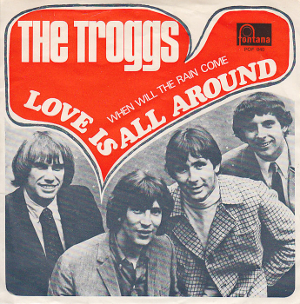
"Love Is All Around" is a song recorded by English rock band the Troggs, featuring a string quartet and a 'tick tock' sound on percussion, in D-major. Released as a single in October 1967, it was a top-ten hit in both the UK and US.
"A Groovy Kind of Love" is a song written by Toni Wine and Carole Bayer Sager based on a melody by the classical composer Muzio Clementi.

"What's on Your Mind (Pure Energy)" is a song by American synth-pop band Information Society that was released as a single in 1988. The "Pure Energy" subtitle derives from a sample of Leonard Nimoy's voice from the Star Trek episode "Errand of Mercy". There are also samples of DeForest Kelley and Richard Tatro's (The Android Norman) voices from the episode "I, Mudd". John Leland of Spin magazine called it a "pretty potent dance record".

"Walkin' on the Sun" is a song by American rock band Smash Mouth from their first album, Fush Yu Mang (1997). Released as their debut single in June 1997, the song was Smash Mouth's first major single, reaching No. 1 on the US Billboard Modern Rock Tracks chart and No. 2 on the Billboard Hot 100 Airplay chart. It was also a success abroad, peaking at No. 3 in Canada and Iceland, No. 5 in Italy and Spain, and No. 7 in Australia, where it is certified platinum for shipments exceeding 70,000.

"Blow Away" is a song by English musician George Harrison that was released in February 1979 on his album George Harrison. It was also the lead single from the album. The song is one of Harrison's most popular recordings from his solo career and has appeared on the compilations Best of Dark Horse 1976–1989 and Let It Roll: Songs by George Harrison.

"Peek-a-Boo" is a song by English rock band Siouxsie and the Banshees. It was released in 1988 as the first single from the band's ninth studio album, Peepshow. Melody Maker described the song as "a brightly unexpected mixture of black steel and pop disturbance" and qualified its genre as "thirties hip hop". "Peek-a-Boo" was rated "Single of the Week" in both Sounds and NME. Sounds wrote that it was a "brave move", "playful and mysterious". NME described it as "Oriental marching band hip hop" with "catchy accordion." They then said : "If this nation was served by anything approaching a decent pop radio station, "Peek A Boo" would be a huge hit."
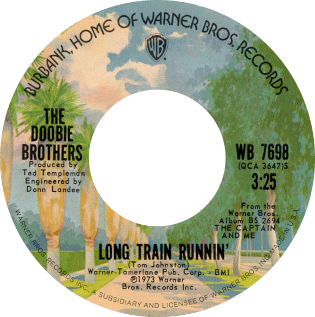
"Long Train Runnin'" is a song recorded by the Doobie Brothers and written by band member Tom Johnston. It was included on the band's 1973 album The Captain and Me and was released as a single, becoming a hit and peaking at No. 8 on the US Billboard Hot 100.

"Fly Like an Eagle" is a song written by American musician Steve Miller for the album of the same name. The song was released in the United Kingdom in August 1976 and in the United States in December 1976. It went to number two on the US Billboard Hot 100 chart during the week of March 12, 1977. The single edit can be found on Greatest Hits (1974–1978). The song has an unusually mellow and "dreamy" feel. It is usually played in tandem with "Space Intro", but the song also segues into "Wild Mountain Honey".
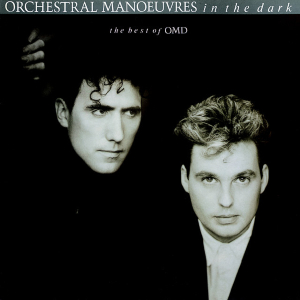
The Best of OMD is a compilation album by English electronic band Orchestral Manoeuvres in the Dark (OMD), released in 1988; marking a decade since the band's beginnings. The record essentially delineates the group's experimental early years from their pop-oriented later work: side one features recordings from 1979 to 1984, while side two is drawn from the group's 1984–1988 efforts.
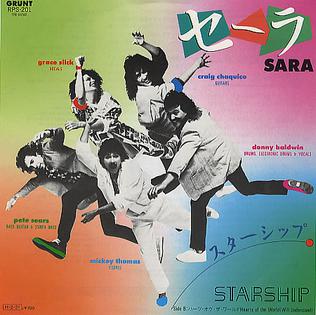
"Sara" is a song recorded by the American rock band Starship which reached number-one on the U.S. Billboard Hot 100 chart on March 15, 1986. It was sung by Mickey Thomas, of the newly renamed band Starship, from their first album Knee Deep in the Hoopla; for this single, Grace Slick provided the backing vocals.

"Your Mama Don't Dance" is a hit 1972 song by the rock duo Loggins and Messina. Released on their self-titled album Loggins and Messina, it reached number four on the Billboard pop chart and number 19 on the Billboard Easy Listening Chart as a single in early 1973.

"Can't Stay Away from You" is a 1987 song by Cuban-American singer and songwriter Gloria Estefan, credited to Estefan and her former band, the Miami Sound Machine. The song was released as the third single from their multi-platinum album, Let It Loose (1987). It became Estefan's fifth top 10 hit in the United States, peaking at #6 on the Billboard Hot 100 chart; it was their second #1 hit on the adult contemporary chart, following 1986's "Words Get in the Way". The song originally peaked at #88 on the UK Singles Chart in May 1988, however the song was re-released after the success of its follow-up, "Anything for You", peaking at #7 in March 1989.
References
- ↑ Prato, Greg (March 16, 2016). "Paul Robb of Information Society : Songwriter Interviews". Songfacts.com. Retrieved September 8, 2021.
- ↑ "Cash Box Top 100 2/25/89". Cashboxmagazine.com.
- ↑ "Barry's Hits of All Decades Pop rock n roll Music Chart Hits". Hitsofalldecades.com. Retrieved March 14, 2022.
- ↑ "RPM Weekly" (PDF). March 18, 1989. p. 6. Retrieved March 14, 2022.
- ↑ "RPM Weekly" (PDF). February 18, 1989. p. 14. Retrieved March 14, 2022.
- ↑ "RPM Weekly" (PDF). March 11, 1989. p. 6. Retrieved March 14, 2022.